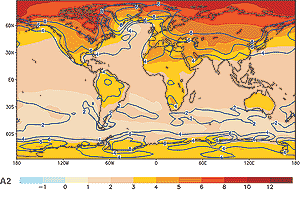 Sunday's New York Times carried a fascinating article by Neela Banerjee, called Citing Heavenly Injunctions to Fight Earthly Warming. Quotes and notes follow.
Sunday's New York Times carried a fascinating article by Neela Banerjee, called Citing Heavenly Injunctions to Fight Earthly Warming. Quotes and notes follow.WYANDOTTE, Mich. — To find St. Elizabeth Roman Catholic Church in this working class suburb south of Detroit, look toward the roofline, for the windmill. Not a big windmill, it is a spare steel structure maybe nine feet high, perched atop the rectory of the church and facing northeast into the winds that come off Lake Erie.... unless the wind is actually coming off Lake St. Clair. Lake Erie is south of Wyandotte, so it wouldn't make sense to face northeast to catch the wind off Lake Erie. Not if you're in Wyandotte.
But I think we can cut the NYT some slack on this one. Rev. Morris probably told Neela Banerjee that the windmill faces northeast to catch the wind off the lake, never imagining that Banerjee would guess wrong about which lake! And we all know that the NYT, with its limited financial and other resources, is not in a position to do any fact-checking -- unlike this nearly frozen blogger!
However...
... the windmill, two solar panels on the roof, another atop the front porch and a solar water heating system above the garage are the pride of the Rev. Charles Morris, St. Elizabeth’s priest.
Over the last five years, Father Morris has sharply reduced his small parish’s energy use and emissions of carbon dioxide, the compound most scientists believe has led to global warming, and he has organized other congregations across Michigan to do the same.
“We’re all part of God’s creation,” Father Morris said. “If someone like me doesn’t speak about its care, who will? The changes we’ve made here, that’s a form of preaching.”
 It's also a faith-based approach to reality, and a realistic one.
It's also a faith-based approach to reality, and a realistic one. I believe!
Unfortunately it is politically charged -- or even politically dangerous -- to acknowledge such reality, when we have a central government that is not only conspicuously "Christian" but also faith-based (in the words of Ron Suskind from in seminal NYT Magazine piece "Without A Doubt", as follows):
In the summer of 2002, after I had written an article in Esquire that the White House didn't like about Bush's former communications director, Karen Hughes, I had a meeting with a senior adviser to Bush. He expressed the White House's displeasure, and then he told me something that at the time I didn't fully comprehend -- but which I now believe gets to the very heart of the Bush presidency.And given that this administration is not only waging war against reality but also, at the same time, waging war against science -- especially the science of climate change.
The aide said that guys like me were "in what we call the reality-based community," which he defined as people who "believe that solutions emerge from your judicious study of discernible reality." I nodded and murmured something about enlightenment principles and empiricism. He cut me off. "That's not the way the world really works anymore," he continued. "We're an empire now, and when we act, we create our own reality. And while you're studying that reality -- judiciously, as you will -- we'll act again, creating other new realities, which you can study too, and that's how things will sort out. We're history's actors ... and you, all of you, will be left to just study what we do."
The inconvenient truth simply will not go away ...
... but the effectiveness of the propaganda effort to suppress this truth is reflected in the fact that many people -- especially evangelical Christians -- still don't understand, or accept, or believe, that climate change is a reality.
Despite the February statement by prominent evangelicals about global warming,Global warming is a fact, whether or not it is caused by human activities. It is certainly exacerbated by human activities. And that's a fact too. Politically and perhaps religiously dangerous facts, but facts nonetheless.many in the pews remain unconvinced, often because they see it as an issue of the political left.
“When I give talks on environmental stewardship at Christian colleges, I have students look me in the eye and ask, ‘Is global warming real?’ ” said Dave Mahan, associate director of the Au Sable Institute of Environmental Studies, a Christian environmental education organization headquartered in Grand Rapids, Mich. “I answer that God wants us to lead a stewardly life whether or not there is global warming.”
Over the last year, religious activism on global warming has won much attention. Last February, 86 evangelical Christian leaders backed an initiative to combat global warming, a move that broke the evangelical movement’s broad silence on the issue...Encounters in their own lives? Encounters with reality, perhaps? Reality does have a way of piercing a faith-based veil. Fortunately, a faith-based veil is not necessary in order to live a life of faith.
...
At ground level, clergy members and lay people have been working to increase awareness of global warming and to reduce their own greenhouse gas emissions. Many, like Father Morris, were active for years before the issue attracted wider concern. Encounters in their own lives awakened them to global warming, they said.
But their faith and the imperatives they see in their Scriptures compelled them to act, they said.
“If you do worship the Creator, you take care of his creation,” said Greg Wickersham, a high school teacher and a member of the environmental ministry at Intown Community Church in Atlanta, which is affiliated with the theologically conservative Presbyterian Church in America.
“If we are made in his image, we should mirror his image in our dominion over the Earth,” Mr. Wickersham said. “He is creative and sustaining, not destructive.”
 And we need His help more than ever. We've wasted so much time. We've listened to so many lies. And now, if it's not too late already, it's certainly not going to get any easier.
And we need His help more than ever. We've wasted so much time. We've listened to so many lies. And now, if it's not too late already, it's certainly not going to get any easier. Just take a look at the news of the day -- any day! I have no doubt that we will soon be seeing many more articles like this one, from today's BBC: Climate water threat to millions.
Climate change threatens supplies of water for millions of people in poorer countries, warns a new report from the Christian development agency Tearfund.And so on...
Recent research suggests that by 2050, five times as much land is likely to be under "extreme" drought as now.